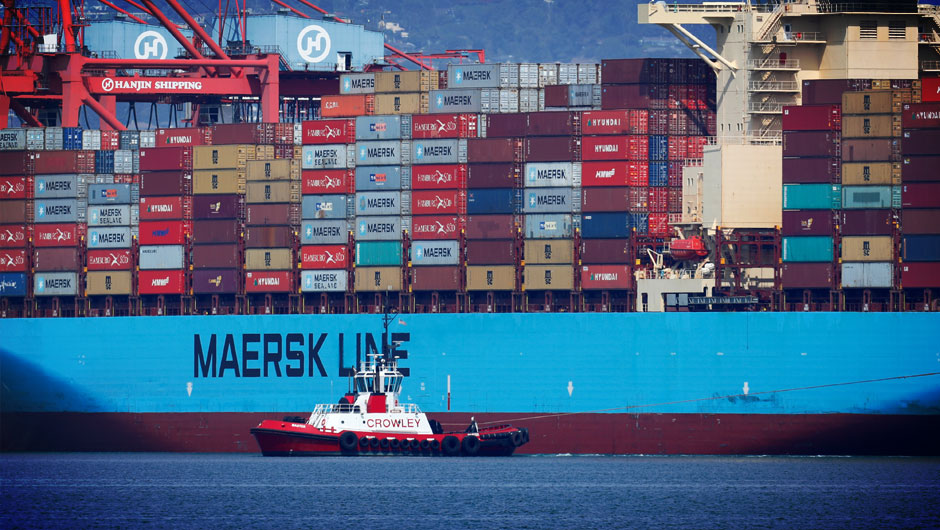

Award for process transformation: Maersk UAE

Nishat Neelay Deshmukh, head of finance at Maersk UAE, smiles. “Think of the last time the last time you purchased really valuable goods or services – do you remember the grin on your face when you saw the bill?”

Of course, nobody enjoys paying a bill, but a payment experience that is quick and simple offers myriad benefits for payer and payee alike. In the manual-orientated and cash-reliant world of the container shipping business, this is easier said than done, but Deshmukh took on the challenge to solve this problem in a way that would add value for both her customers and Maersk UAE, a Dubai-based subsidiary of global shipping giant Maersk.
“We used to have one-fifth of our entire staff working behind counters collecting freight charters via cash and cheque so that we could print documents to enable customers to pick up or transfer ownership of shipments” Deshmukh says. “We recognised the inherent inefficiencies of manual processes, security of cheque storage and the huge queues of customers in our offices, and set out on a project to simplify, integrate and digitise processes. We wanted to create a self-service solution with safe payment options that our customers could trust”.

Changing age-old processes and customer demands requires some time and dedication. “It has taken a couple of years to get the customers wanting something different” she says. “When the transformation began, all we started doing was to encourage customers who prefer to come with bags of cash to go and visit a bank branch, go home and activate a bank transfer and get the documents printed online – as simple as that”.
As a business that relies on goodwill and personal interactions, where many customers preferred going to the offices, even something as simple as switching to bank transfers was not an easy process.
“Customers talked about the transaction costs of making those bank transfers, which overrode the perceived efficiency gains in their eyes. To improve the uptake, we had to open a bank account with a reputable local bank so that a section of our clients, in the SME side, could open a local bank account with zero transfer costs. Even smaller customers could use the cash deposit machines of this bank”.
Eventually, 80% of footfall from counters shifted from the Maersk offices to the banks. While this meant the company could close down cash counters in the UAE, it also left new challenges as the customer expectations evolved to become real-time.
“On the backend there were still some manual interactions between us and the customer, who now expected instant release of documents and also demanded an updated and accurate statement of account. Deshmukh comments. “For this to happen, the still-manual process of reconciliation needed to evolve as well. We set out to reduce the document release process from the two-hour committed service level agreement (SLA) to our clients all the way down to zero”.
 When they took this decision, they changed banking partners. “In hindsight, this was perhaps the best decision in the process” Deshmukh says. “We selected an automated AR solution from our new banking partner that ensured maximum efficiency in the collections process. Hosted on our website, it offers a true end-to-end automated process”.
When they took this decision, they changed banking partners. “In hindsight, this was perhaps the best decision in the process” Deshmukh says. “We selected an automated AR solution from our new banking partner that ensured maximum efficiency in the collections process. Hosted on our website, it offers a true end-to-end automated process”.
Once the customer selects the invoices to be paid in the portal, the host-to-host direct debit instruction is auto-triggered from Maersk to the bank, enabling the bank to collect the funds from the customer’s account from any bank in the UAE and credit it to Maersk’s account.
“The entire direct debit transaction is tagged with a unique ID that travels through the various processing systems and ultimately forms part of the credit entry on our account. It is important for us to have a transaction reference that is localised and known to the customer, as the cargo itself may change ownership several times. An automated end-of-day report then allows us to recognise the collection and reconcile it against the outstanding invoice of the customer”.
The results of this project have already created benefits and cost savings for both Maersk and its customers. “By incorporating the digitised solution, we have eliminated the bottlenecks and inefficiencies that were creating collection costs” Deshmukh says. “By replacing redundant processes with technology, we have optimised our cash flow and mitigated the risk of bad debts and write-offs. Customers owning their own transactions have improved their cash forecasting and avoided an overwhelmingly manual reconciliation process”.
The amount of money digitised as a result of this transformation project stands at around $300 million. “Significantly for customers, this meant that they were able to negotiate additional credits with Maersk as the payments were coming in a bit quicker” Deshmukh explains. “This is something we could afford to do with a cash flow that had been quickened by 24 hours. Maersk UAE is now a cashless operation”.